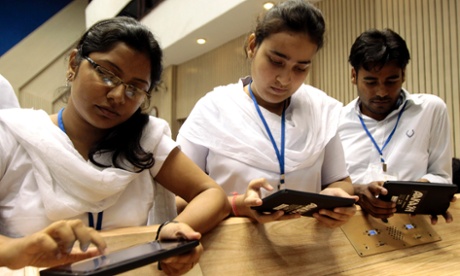
The Indian government is expanding its scheme to bring affordable computing to the education sector by announcing that a tablet costing just £14 will launch in India in 2014.
India's telecoms minister, Kapil Sibal, announced yesterday that the Aakash 4 tablet will be built from January, and although it will initially go on sale for 2,500 rupees (£24.60), it will eventually be sold to the public for only 1500 rupees, or £14.
The Aakash 4 will feature a seven-inch scratch resistant touchscreen. It will support wifi, 3G and 4G connectivity and will have 4GB of internal storage. Users will be able to add external memory cards with storage capacity of up to 32GB.
Sibal said that children no longer only learn from books, teachers and parents, as technology now plays an important part. "No longer is the teacher the sole repository of knowledge. Children get knowledge from all sorts of sites," he said.
The new tablets will be built by a number of manufacturers, Sibal said, speaking at the Modern School in New Delhi on Thursday.
The announcement suggests the Indian government's partnership with UK-based Datawind, who built the previous Aakash products, has come to an end. Datawind built previous Aakash products including the Ubislate 7Ci, which at £30 is currently the cheapest tablet on the market.
The Indian government launched the Aakash series of tablets (which means “sky” in Hindi) as part of India’s effort to put ultra-low cost tablets in universities and colleges. Datawind later won the tender to build the tablets for the Indian government in 2011, before shipping them to Indian students in 2012 and following up with the Aakash 2 tablet.
The announcement was made at Access, a yearly conference run by Modern School in New Delhi, which brings together 1,000 students from more than 100 schools in the region.
The Modern School also has a partnership with Samsung, whereby one classroom is fitted with 40 tablets and a 72-inch LED TV. Although the classrooms have smart (or interactive) boards, the tablets enable a two-way communication between the teacher and children, according to Gautam Sarkar, the Modern School's head of IT.
• Samuel Gibbs and Charles Arthur review the best and worst tablets of the year
• This article was amended on 23 December 2013 to correct the name of the Indian communications minister, Kapil Sibal.

